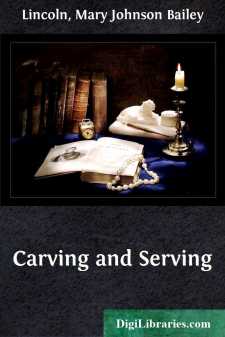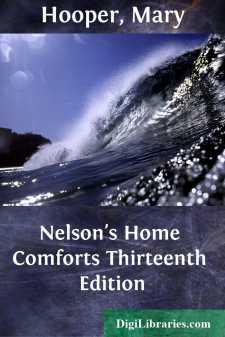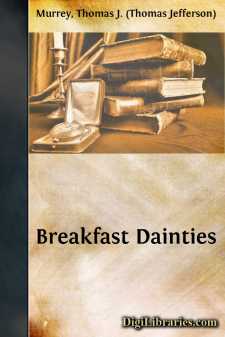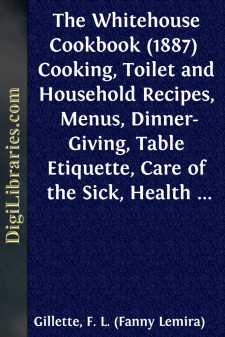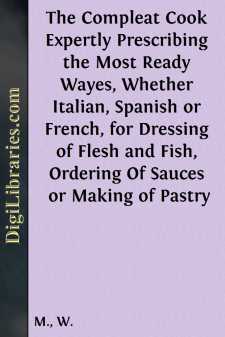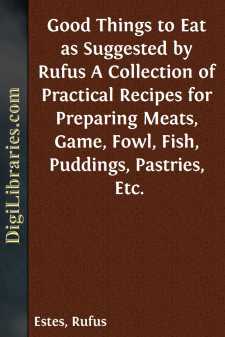Cooking
- General
- History 1
- Reference 10
- Regional & Ethnic 3
- Vegetarian 10
General Books
Sort by:
GENERAL DIRECTIONS. "Do you teach your pupils how to carve?" "Please give us a lecture on carving; my husband says he will come if you will." I have been so frequently addressed in this way that I have decided to publish a manual on the Art of Carving. Instruction in this art cannot be given at a lecture with any profit to my pupils or satisfaction to myself. One cannot learn by simply...
more...
by:
Robert May
To the Right Honourable my Lord Montague, My Lord Lumley, and my Lord Dormer; and to the Right worshipful Sir Kenelme Digby, so well known to this Nation for their Admired Hospitalities. Right Honourable, and Right Worshipful, HE is an Alien, a meer Stranger in England, that hath not been acquainted with your generous House-keepings; for my own part my more particular tyes of service to you my Honoured...
more...
by:
Mary Hooper
PREFACE. In presenting our friends and the public with the thirteenth edition of our "Home Comforts," we have the pleasure to remark that so greatly has the book been appreciated, that the large number of FIVE HUNDRED THOUSAND copies has been called for. The value of the Jubilee Edition was enhanced by some new recipes; these are repeated in the present edition, to which, also, some valuable...
more...
by:
Mary Randolph
SOUPS ASPARAGUS SOUP. Take four large bunches of asparagus, scrape it nicely, cut off one inch of the tops, and lay them in water, chop the stalks and put them on the fire with a piece of bacon, a large onion cut up, and pepper and salt; add two quarts of water, boil them till the stalks are quite soft, then pulp them through a sieve, and strain the water to it, which must be put back in the pot; put...
more...
REMARKS ON BREAKFAST COOKERY. "Dinner may be pleasant, So may social tea;But yet methinks the breakfast Is best of all the three." The importance of preparing a variety of dainty dishes for the breakfast table is but lightly considered by many who can afford luxuries, quite as much as by those who little dream of the delightful, palate-pleasing compounds made from "unconsidered...
more...
CARVING. Carving is one important acquisition in the routine of daily living, and all should try to attain a knowledge or ability to do it well, and withal gracefully. When carving use a chair slightly higher than the ordinary size, as it gives a better purchase on the meat, and appears more graceful than when standing, as is often quite necessary when carving a turkey, or a very large joint. More...
more...
by:
W. M.
THE COMPLEAT COOK: Expertly prescribing the most ready wayes, whether Italian, Spanish, or French, for dressing of Flesh and Fish, &c. To make a Posset, the Earle of Arundels Way.. Take a quart of Creame, and a quarter of a Nutmeg in it, then put it on the fire, and let it boyl a little while, and as it is boyling take a Pot or Bason, that you meane to make your Posset in, and put in three...
more...
CHAPTER I INTRODUCTIONUntila comparatively recent period, education was regarded mainly as a means of training the intellect, but this conception of education is now considered incomplete and inadequate. Our ideas of the purpose of schools are becoming broader, and we have decided that not only the mental nature, but all the child's activities and interests, should be given direction by means of...
more...
by:
Elizabeth Moxon
ENGLISH HOUSEWIFRY. 1. To make VERMICELLY SOOP. Take a neck of beef, or any other piece; cut off some slices, and fry them with butter 'till they are very brown; wash your pan out every time with a little of the gravy; you may broil a few slices of the beef upon a grid-iron: put all together into a pot, with a large onion, a little salt, and a little whole pepper; let it stew 'till the meat...
more...
by:
Rufus Estes
SKETCH OF MY LIFE I was born in Murray County, Tennessee, in 1857, a slave. I was given the name of my master, D. J. Estes, who owned my mother's family, consisting of seven boys and two girls, I being the youngest of the family. After the war broke out all the male slaves in the neighborhood for miles around ran off and joined the "Yankees." This left us little folks to bear the burdens....
more...


